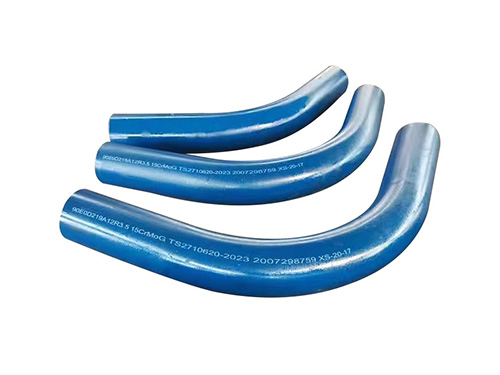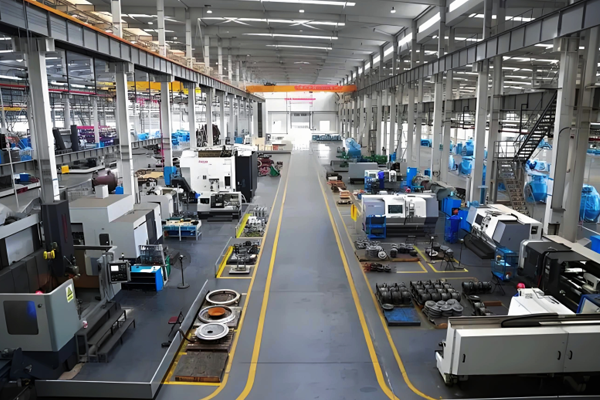
High-Pressure Alloy Steel Elbow
A High-Pressure Alloy Steel Elbow is a specialized pipe fitting designed to redirect fluid or gas flow in high-pressure pipelines(typically operating at pressures exceeding 10 MPa/1450 psi)while withstanding extreme temperatures and mechanical stress.Made from alloy steel—carbon steel blended with elements like chromium,molybdenum,nickel,or vanadium—these elbows offer superior strength,toughness,and heat resistance compared to carbon steel or stainless steel alternatives.They are critical in industries where system failure could lead to catastrophic consequences,such as oil and gas,power generation,and chemical processing.Below is a detailed overview of their key features,materials,applications,and design considerations:
1.Core Features of High-Pressure Alloy Steel Elbows
Exceptional Strength:Alloy steel’s high tensile strength(often 600–1200 MPa)and yield strength(400–900 MPa)allow it to withstand extreme internal pressure without deformation or rupture.
High-Temperature Resistance:Alloying elements(e.g.,chromium,molybdenum)form stable oxides,enabling these elbows to perform in temperatures ranging from-50°C to 650°C(and higher for specialized alloys).
Corrosion and Oxidation Resistance:Alloys like chrome-moly(Cr-Mo)resist corrosion from moisture,gases(e.g.,hydrogen sulfide),and high-temperature oxidation,extending service life.
Toughness:Alloy steel maintains ductility even in low temperatures,preventing brittle fracture—a critical trait in high-pressure systems where sudden pressure spikes or thermal shocks are common.
Precision Manufacturing:Produced via forging,hot forming,or seamless processes to ensure uniform wall thickness,tight dimensional tolerances,and minimal internal defects(e.g.,cracks,inclusions)that could fail under pressure.
2.Design and Manufacturing Standards
High-pressure alloy steel elbows must adhere to strict industry standards to ensure safety and performance.Key standards include:
ASME B16.9:Specifies dimensions,tolerances,and testing for factory-made wrought steel buttwelding fittings(including elbows)for high-pressure service.
ASME B16.28:Covers seamless and welded wrought steel elbows for high-pressure applications with larger diameters or custom angles.
API 5L/5CT:Used in oil and gas pipelines,requiring elbows to withstand sour service(H₂S-containing environments)and meet toughness requirements(e.g.,impact testing at-46°C).
EN 10253-2:European standard for butt-welded fittings,including alloy steel elbows for high-pressure industrial systems.
Critical Design Parameters:
Angle:Most common are 90°and 45°;180°return bends are used for U-turns in high-pressure loops.
Wall Thickness:Designed to ASME Schedule 80,160,or XXS(extra extra strong)to handle pressure—thicker walls reduce stress concentration at the bend.
Radius:Long-radius elbows(1.5×nominal pipe size)minimize pressure drop and turbulence,while short-radius elbows(1×nominal pipe size)save space but may increase flow resistance.
3.Manufacturing Processes
High-pressure alloy steel elbows are manufactured using processes that ensure structural integrity under extreme stress:
Hot Forging:Heats alloy steel billets to 1000–1200°C,then shapes them into elbows using dies.This process refines the grain structure,enhancing strength and toughness.
Seamless Forming:Uses a piercing mill to create a seamless tube,which is then bent or pressed into an elbow shape.Eliminates weld seams(a common failure point in high-pressure systems).
Welded(Butt-Welded):For larger diameters,two or more alloy steel segments are precision-welded.Post-weld heat treatment(PWHT)is mandatory to relieve residual stresses and prevent cracking.
4.Applications
High-pressure alloy steel elbows are indispensable in industries where pipelines handle high pressure,temperature,or aggressive media:
Oil and Gas:Upstream(drilling mud lines,wellhead manifolds),midstream(high-pressure gas transmission),and downstream(refineries,hydrocracking units).
Power Generation:Thermal power plants(high-pressure steam lines,turbine feedwater systems)and nuclear power(secondary coolant loops).
Chemical Processing:High-pressure reactors,solvent transport lines,and acid/gas handling systems(resistant to corrosive byproducts).
Aerospace and Defense:Fuel lines in rocket engines or high-pressure hydraulic systems in aircraft.
Mining:High-pressure water jet cutting systems and slurry transport lines(with added wear resistance for abrasive materials).
5.Testing and Quality Control
To ensure reliability,high-pressure alloy steel elbows undergo rigorous testing:
Hydrostatic Testing:Pressurized with water(1.5×design pressure)to detect leaks or deformation.
Non-Destructive Testing(NDT):
Ultrasonic Testing(UT):Checks for internal defects(e.g.,cracks,inclusions).
Radiographic Testing(RT):Inspects weld seams for porosity or incomplete fusion.
Magnetic Particle Testing(MT):Identifies surface cracks in ferromagnetic alloys.
Mechanical Testing:Tensile,impact(Charpy V-notch),and hardness tests to verify strength and toughness.
Chemical Analysis:Ensures alloy composition meets grade specifications(e.g.,chromium/molybdenum content).
6.Limitations and Considerations
Cost:Alloy steel is more expensive than carbon steel due to alloying elements and specialized manufacturing,but its durability justifies the investment in high-pressure systems.
Corrosion in Severe Environments:While alloy steel resists general corrosion,it may not withstand highly acidic or chloride-rich environments(e.g.,seawater).In such cases,nickel-based alloys(e.g.,Inconel)or clad elbows(alloy steel core with corrosion-resistant lining)are used.
Welding Complexity:Alloy steel requires precise welding parameters(e.g.,preheating to 200–300°C,PWHT)to avoid cracking.Improper welding can compromise strength.
Temperature Limits:Even high-alloy grades have upper limits(e.g.,12Cr alloys struggle above 650°C);for extreme heat(e.g.,800°C+),ceramics or refractory metals may be needed.
Summary
High-pressure alloy steel elbows are engineered to thrive in the most demanding pipeline conditions,combining alloy steel’s strength,heat resistance,and toughness with precision design.Their adherence to strict standards,rigorous testing,and specialized manufacturing make them critical for safe,reliable operation in industries like oil and gas,power,and chemicals.When selecting one,factors such as alloy grade,pressure/temperature ratings,and testing requirements must align with the pipeline’s specific needs to ensure long-term performance.

+86-15533769121

Jango

jango@yuntaopiping.com

Beixiaozhuangzi Industrial Zone, Mengcun Hui Autonomous County
Copyright © 2025-2026 http://www.yuntaopiping.com. All Rights Reserved Yuntao Piping Group.,Ltd.Copyright



